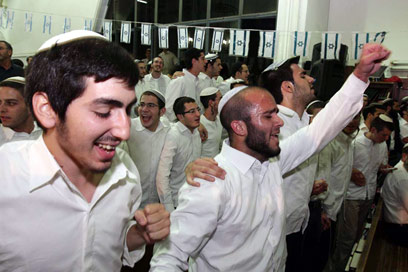For years, the only people I saw at progressive programs on Israel were silver-haired. In my 30s, I missed being around my peers. But today this has changed dramatically. A new generation of 20 and 30 somethings is fully engaged in the Israel/Palestine issue. These young activists are radical, powerful and constitute a community in their own right. Groups such as Young, Jewish and Proud are taking back their voice from the spokesmen for mainstream, Zionist organizations.
A few days ago a book arrived in the mail by Jack Ross, a young author who is deeply committed to a Judaism not rooted in Zionism. His new Rabbi Outcast is a biography of Rabbi Elmer Berger, one of the leaders of the American Council for Judaism. In the Jewish community, the ACJ is remembered more for its "classical Judaism" approach to ritual. More traditional Jews considered this "classical Judaism" to be too much of a concession to Christian modes of worship.
But the American Council for Judaism was formed primarily as a response not to traditional ritual but to the new political ideology of Zionism. This new Zionist American Jewish identity was ushered in by Supreme Court Justice Louis Brandeis in the early part of the 20th century and triumphed by such rabbinic leaders as Stephen Wise into the 1940s. Elmer Berger wanted to return to the principles of 19th century Reform Judaism. As Ross describes in the book's prologue, Berger was following in the footsteps of the founder of Reform Judaism in the U.S., Rabbi Isaac Meyer Wise (no relation to Stephen) who saw Judaism as an American religion and not a political movement of the Jewish people in the Middle East. in the tradition of the early Reform leaders he placed the emphasis on religious principles not peoplehood.
Jack Ross has made a thoughtful contribution in bringing into the present an alternative to the mainstream path taken by American Judaism. His detailed account of the internal workings of the American Council for Judaism in the mid-20th century offer positive - and cautionary - insights into how to organize an alternative camp in the face of a dominant mainstream.
Ultimately, the UCJ vanished into irrelevance. This was inevitable in the wake of the establishment of the State of Israel in May 1948 and the popular response to its successes in the United States. Similarly, within the State of Israel, Martin Buber, who had campaigned against Ben Gurion's plan for a Jewish state, accepted the new reality too. Even within the Zionist camp, dissenting voices such as the European/American scholar Simon Rawidowicz were drowned out by David Ben Gurion's militant Zionism.
Jack Ross has provided ample footnotes and goes into great detail. However, I do wonder about some statements such as his description of Berger's classmates in rabbinical school. "A large number were of Orthodox background, often the sons of rabbis or other Orthodox functionaries such as mohels or kosher butchers for whom the Reform rabbinate was practically the only path to upward social mobility in the New World." (p. 26) I would have welcomed more explanation and attribution for such a broad description.
In the American Jewish community Zionism became dogma to the point where, until very recently, American Jews could not even comprehend the possibility of other valid viewpoints. My sense is that this is beginning to change. The overwhelming flow of images and news about the violent excesses and discriminatory policies of the State of Israel are making it necessary and possible for groups such as Jewish Voice for Peace (with which both I and Jack Ross are involved) to articulate alternate visions. Jack Ross' book moves the conversation forward and gives us a touchstone towards re-imagining American Jewish identity.


